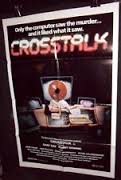
CROSS TALK
Australia, 1982, 83 minutes, Colour.
Gary Day, Penny Downie, John Ewart, Peter Collingwood, Kim Deacon, Jill Forster.
Directed by Mark Egerton.
Crosstalk is one of several Australian thrillers made in 1981-82, following tax concessions. Several of the films were condemned by critics as 'quickies'. This 80-minute film has many of the elements of a quickie, especially in the script. However, in terms of production, it is a very handsome film: Panavision colour photography, Sydney locations, excellent interior decors with a focus on computers. Initial director was Keith Salvat who was replaced by assistant director Mark Egerton. Egerton also contributed to the screenplay.
While the film is handsome, it is an imitation and tribute to, Alfred Hitchcock's Rear Window. In fact, the screenplay follows the original very closely at times. Needless to say, the tribute/imitation pales in comparison with the original. However, the idea is very interesting: the injured hero does his surveillance by computer rather than by binoculars. There is a background of multinational business deals and cover-ups rather than an individual murder. Gary Day is a rather dour hero. Kim Deacon is a young nurse but a bit in the vein of Thelma Ritter. Penny Downey is an attractive Grace Kelly equivalent. John Ewart is a contrived sinister villain. While there are many excellent aspects to Crosstalk, the film remains slight - but on its contrived lines it is quite enjoyable.
1. The appeal of the thriller? Computer thrillers of the 80s? Audience interest in computers? Surveillance? Privacy? Multinationals? Individuals against groups? The contrived screenplay - and audience acceptance of this?
2. The film as an Australian thriller: Sydney and Blue Mountains locations, the atmosphere of the city? City characters? Audience identification with characters and interests?
3. Panavision photography, colour, sets, computers, machines? The audio visuals? Surveillance? The importance of editing, close-ups, tracking styles, suspense and shocks? The electronic score and its atmosphere?
4. The background of computers and their use, human construction, invention, solving of problems, control? The computer and its registering information without thinking? The combination of technology with human thought? The value of computers? Space, size, expense? Power? The fascination with the technical? Cindy's reference to the computer as a beast? The sexual innuendo of Ed's being married to the computer?
5. The computer as character? The focus of attention during the credits? The opening? Its being moved into its own apartment? Its manner of surveillance and recording? Images, sounds? Its red light coming on? Taking on a life of its own? Making judgments on characters - so it seems? Ed and his obsession? Cindy and her dislike, final fascination and revelation? Jane and surveillance? Lights, movement, characters? The computer killing?
6. Ed as hero? Dedication and preoccupation, his work in invention, relationship with Cindy? Their retreat home, their arguing, via monitors and screens? The clashes and the accident? His recovery? The pressure from the bosses? The preoccupation with improving the computer? Therapy? Jane and the accident in the baths? Her going to look at the Stolliers’ apartment? Her death? Cindy and her support, antagonism? Whitehead and his pressures? Hollister and his visits, sinister attitudes? His preoccupation with the murder hypothesis? Checking out the computer's information? Theories, solutions? Bugging the phone, sending Jane into the apartment? The revelation of the phone calls? Growing dangers? Stollier and Whitehead and the final killing? A dour hero? Strong hero?
7. Cindy as heroine - concern, rival to the computer, clashes, help, sceptical about the murder, the confrontation at the end?
8. Jane and her work, bright and breezy, the human touch, the accident in the swimming pool, going up and hiding in Stollier's apartment, the lift and her death?
9. George and his age, rivalry, Whitehead's pawn, temptation and evil, pressures on Ed, his attempt to kill him, the phone call, his own death, as a hobo in the gardens?
10. Whitehead and his suave villainy, pressures, control, attempt to murder, confrontation with Stollier, taking the gun? The credibility of his killing Stollier?
11. Stollier and his sinister manner, smoking, his wife and the clashes, the outing and the lift, the killing of her with the loud music? The prostitute and his sexual deviance? The cover-up? The killing of George? The prostitute dressed as his wife? Ed's surveillance and his missing Stollier's return? The search of the apartment? His wife's head in the machine? The killing of Jane? The phone calls? The attack on Ed and his own death?
12. Atmosphere of suspense, the mood of suspense, clues? The opening and the focus on the computer giving clues and malfunctioning? The phones and the bugging? The special effect with the wife's head in the machine, her eye looking out of the bag in the lift?
13. The focus on machines and humanity? The importance of thriller conventions?
14. The direct parallels with Hitch cock's Rear Window? The film as imitation of, development of, tribute to?